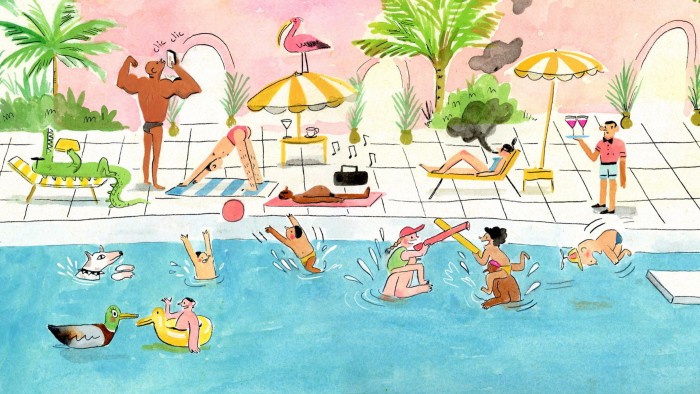This article is part of FT Globetrotter’s guide to Miami
You can almost hear the familiar, raspy voiceover of the world’s most celebrated nature documentarian: we are observing a fragile environment, in which creatures of varying stripes and sizes have congregated near a glistening body of water. The young seek to play, tugging at their parents for attention; others desire rest, drinks in hand and beach reads on display. A uniformed crew hustle to ensure harmony and contentment among all, observing, advising, delivering. Someone pulls out a phone. And the side-eyes start twitching.
This is the hotel pool, an ecosystem ruled by the practice of often unspoken behavioural codes. In Miami, a fast-growing hub for luxury, capital and influence (er, influencers), with technology increasingly present, swimming-pool etiquette is evolving and more important than ever, particularly during winter months when tourism to the Sunshine State is at its peak. Hotels each have their own pool conventions and suggested protocol (and often multiple pools, each with different rules); some are more relaxed, others more stringent — but there is common ground. Here is our guide to the new rules of the hotel pool, with advice from some of Miami’s waterside maestros.
Photography and videography
With a smartphone and therefore a camera attached to the end of every guest’s arm, photography has become a particularly fraught subject, especially when it comes to the time- and space-consuming gathering of social media content. “Technology is taking over,” says Rodrigo Falcon, director of guest experience at the luxurious Four Seasons at the Surf Club, tall and bronzed in a uniform of polo shirt and shorts, who has led the pool crew here for five years.
“Sometimes when people take too many pictures, we have to ask them to stop,” he says. “Our guests want privacy, so we have zero tolerance for people taking pictures of other guests.” He advises those who want to take pictures to be conscious of others, and he’s happy to help camera-happy influencer types speed things along. “I’m normally the photographer,” he says. “I guide them where to take the best pictures.”
The Setai, a sceney upscale hotel in South Beach, takes a firmer approach. “We encourage guests not to take pictures,” says Vitalii Andriianov, the head of pool and beach staff, who after winning the green card lottery in 2017 moved to Miami from his home in Siberia, where he was an oil and mining engineer. He cites the hotel’s draw for VIP and celebrity guests who might be nervous with cameras around (Drake is apparently a regular). “But a selfie in a pool cabana is fine,” he adds. Discretion is the rule. Don’t even think about bringing a drone.
Other new-school considerations
Portable speakers are another modern concern that hotel guests and pool attendants increasingly encounter — and they are categorically not allowed, so bring headphones (Andriianov says his poolside staff will provide a pair to anyone who needs them). And while etiquette around smoking has historically been a faultline (it’s banned at most pools and, as of last year, at Miami’s beaches), the use of vapes and e-cigarettes has now come to the fore.
“Vaping is a sensitive question,” Andriianov says. Choose your e-cig wisely, and be prepared to put it away: “If it’s without smoke, it’s allowed, but if there’s too much [vapour] it’s not allowed, so no one has to breathe it.” Falcon says he might ask guests to move to an area that’s further from the pool and other people, so they can vape without bothering anyone.
Navigating old-school questions of etiquette can still be a minefield for travellers too. Can you reserve chairs? Do you tip pool attendants? What about children? Are what are the rules around drinking?
Reserving chairs
Both Falcon and Andriianov say there’s no need to reserve your own chairs. They suggest letting an attendant know around breakfast time when you’re planning to head to the pool (and any seating preferences) and they’ll have a place ready. If you’re not on time, expect the spot to be held for 30-45 minutes, “then we release the chairs”, Falcon says.
Tipping
And should you tip for their service? In short, yes. “It’s hard work,” Andriianov says, smartly dressed in a navy-blue suit, his uniform for the pool deck. “The sun doesn’t spare anyone.” The automatic service charge on bills for poolside food and drink often goes to servers, not the pool attendants, so they are always grateful to be acknowledged. “It makes both sides happy — people feel good when they leave or get a tip,” Andriianov says. As for how much to leave, “it’s whatever people feel is appropriate”. (A 20 per cent tip for any service is standard across the board in Miami.)
Falcon says that at luxury hotels such as the Four Seasons, one of the city’s more expensive stays, the level of service they provide is reflected in the room rate, though tips are certainly appreciated. “Sometimes guests tip each day of a stay, at the end or at the beginning,” he says. Tips usually range between $20-$100 per day, but $20 is the norm.
Family-friendliness
As for kids, family-friendly hotels usually have swimming pools that are specifically reserved for children, and the general rule is to be mindful of noise levels and safety — so no running. Poolside games and toys are often provided, but “we don’t allow big toys, like waterguns”, says Andriianov.

Family-friendliness extends to dogs, which are a more regular presence post-pandemic as people increasingly travel with their pets. Dogs can be in pool areas, but on a lead or in a bed (or, in Miami, a bag). “We sit them in the shade with water and treats,” Falcon says. “But we have to be aware that not everyone likes dogs, so we have to control where they sit.”
I ask about PDA (public displays of affection), having recently witnessed a swimmer attempting to dodge a couple wrapped around each other like octopuses, attached at the mouth, adrift and unaware. Falcon says to remember that “you’re not in a house, you’re sharing space with others”. Sometimes he has to step in if he senses that a couple’s PDA is bothering other guests and might move them to a quieter pool or offer a complimentary cabana: “I’m not shy to tell the couple, but I find the right moment and the right words to explain [the situation].” (He also suggests heading to a pool as early in the day as possible if you’d like to swim laps.)
As for drinking? Go right ahead — but be aware of your environment. “I’m from Russia, I don’t care,” Andriianov says with a laugh. “We don’t have an issue [with drinking]. It’s not a party scene, but you can enjoy the environment and feel relaxed.”
Pool-party etiquette
The party scene, another facet of Miami hotel-pool culture, is its own ecosystem of day drinking, DJs, dancing, poolside posing, peacocking and splashing about. Does etiquette differ, and are the rules as strict in an environment that’s meant to be loose? To find out I venture to the legendary Fontainebleau hotel, which since it opened 70 years ago has welcomed every US president since Dwight D Eisenhower and been an axis for noted pleasure-seekers, including the likes of Frank Sinatra, Dean Martin and Liberace.

The pool deck at the Fontainebleau is vast and vibrant, with a total of 11 swimming pools, one of which is designated for partying — the Arkadia Day Club, an upbeat, merry-making set-up open Friday to Sunday from noon to 6pm. Hotel guests and the paying public ($500-$3,000 for a chair, daybed or cabana, depending on season) can expect live DJs (Calvin Harris will be hosting on New Year’s Eve), bachelor and bachelorette parties, and bottle service. The parties reach a peak during Art Basel, the Miami Grand Prix and Miami Swim Week.
“It’s designed to be a lush, adults-only tropical playground,” says Cole Boucher, founder of Essential Hospitality, the management company that oversees pool operations at Fontainebleau. But there are a few rules to bear in mind. Beverages should be consumed “safely and responsibly”, he says, and “when it comes to taking photos and videos at the pool, we recommend being mindful of people around you and capturing your memories without interfering with others making theirs.
“Remember, others might not be as excited to be photographed as you might be, so keep it to your friends and family in the shot,” he adds. And “if you’d like to smoke or vape, do so with mindfulness for the pool-goers around you. Keep a respectful distance, especially if food or beverages are around, and properly dispose of used cigarettes or cartridges.”
As for what to wear? Swimsuits, of course, but once you leave the pool deck for the bathrooms or other areas of the hotel, “resort attire must be worn at all times including shoes, tops, bottoms and cover-ups”.
Later that afternoon, seeking an environment categorically more low-key, I head to the quietest of my hotel’s pools with my laptop. Also present are five other adults, two school-age children, a chihuahua and an enormous fluffy Alsatian. The dogs are in the shade, on leads and relaxed, intermittently slurping their water bowls or nosing their humans for a pat. The parents remind the children to mind their splashing and “use inside voices”. Two men enjoying a few beers chat animatedly but at a considerate volume, and I quietly tap on my keyboard, with no need to have earphones in. Everyone seems satisfied. The system works.
Share your Miami poolside-etiquette tips in the comments below. And follow FT Globetrotter on Instagram at @FTGlobetrotter
Cities with the FT

FT Globetrotter, our insider guides to some of the world’s greatest cities, offers expert advice on eating and drinking, exercise, art and culture — and much more
Find us in Miami, Copenhagen, Paris, Rome, London, Tokyo, New York, Frankfurt, Singapore, Hong Kong, Toronto, Madrid, Melbourne, Zürich, Milan, Vancouver, Edinburgh and Venice









